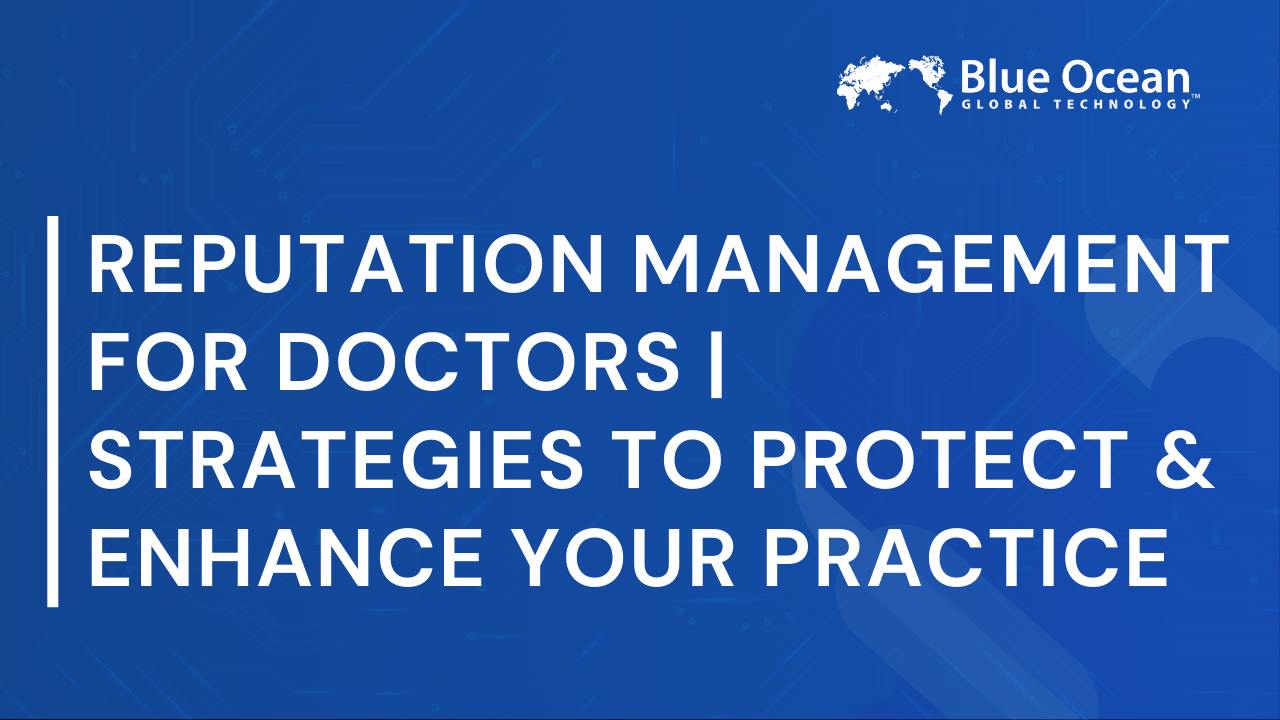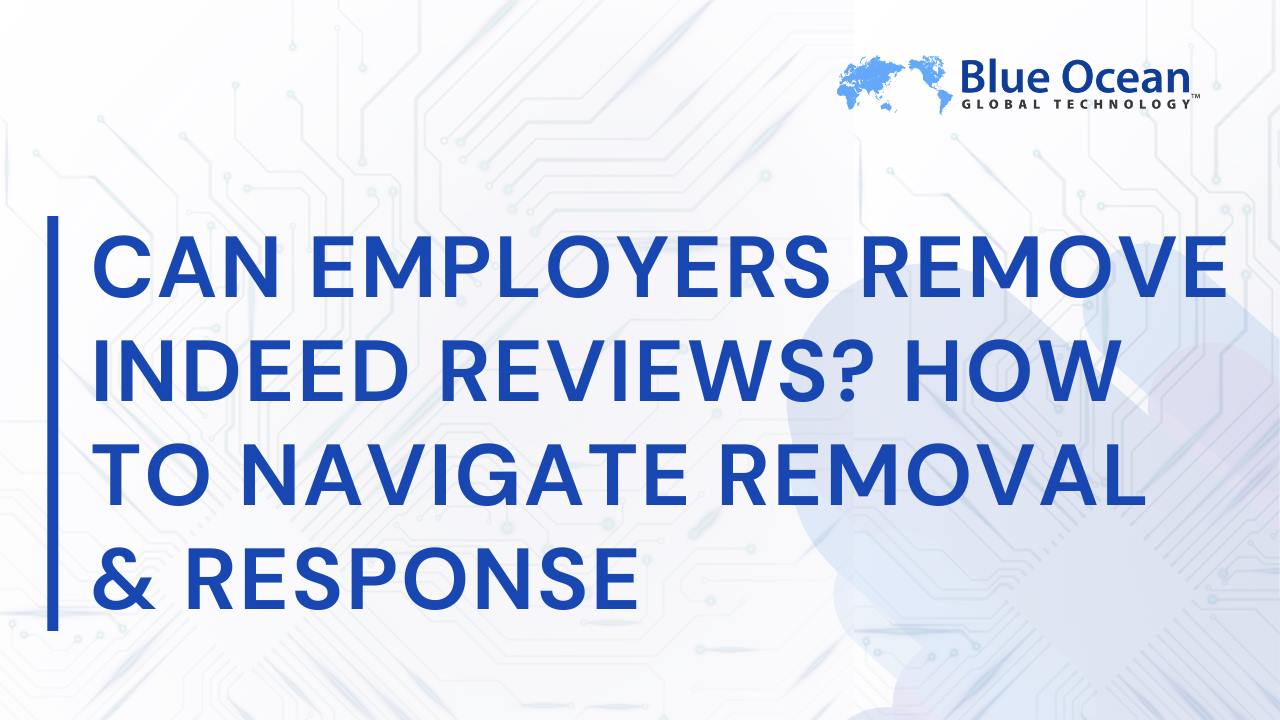Doctors and healthcare practices thrive on trust and credibility. In an increasingly digital world, reputation management is no longer optional but essential. A doctor’s professional image can affect patient decisions, fostering growth or deterring new patients based on the portrayal of their practice online. Competitors often emphasize actionable strategies, urgency, and service solutions, underscoring the value of a clear, structured approach to reputation management.
This guide demonstrates the significance of reputation management for medical professionals and its impact on patient trust. We outline strategies for managing online reviews, responding to feedback, and building a positive digital presence. Blue Ocean Global Technology provides expert reputation management services specifically designed to help healthcare professionals safeguard and enhance their online image.
Why Reputation Management is Vital for Doctors
Reputation management is indispensable for physicians and medical practices striving to maintain trust and attract new patients in today’s competitive healthcare landscape.
Why is Reputation management Important for Doctors?
A doctor’s reputation directly affects patient decision-making. Potential patients frequently rely on online reviews, star ratings, and online presence to assess credibility before booking appointments. Without an effective reputation management strategy, medical professionals risk losing patients to better-rated competitors. Worse, neglecting reputation management can amplify the impact of negative reviews, damaging trust.
For healthcare practices, reputation management delivers concrete benefits: fostering trust, retaining loyal patients, and showcasing high-quality care. This leads to increased patient volume and long-term stability for medical providers.
Why do Online Reviews Matter for Medical Professionals?
Online reviews significantly influence patient choices. Studies show that patient perception is heavily linked to review content and star ratings, with favorable reviews often tipping decisions toward one practice over another. While star ratings provide an overview, detailed and consistent analysis of reviews offers critical insights into areas for improvement.
According to a 2023 Pew Research study, 71% of patients view online reviews as the first step in selecting healthcare professionals. For doctors, proactively managing this feedback is key to winning patient trust and improving outcomes.

What Challenges Do Doctors Face Online?
Doctors encounter unique challenges in maintaining their online reputation. Harmful reviews and defamatory content can misrepresent their practice, deterring potential patients. Privacy remains another critical concern; adhering to the Health Insurance Portability and Accountability Act (HIPAA) requires care when responding to reviews.
Additionally, time constraints make it difficult for busy medical professionals to monitor and track reviews consistently. This can prevent them from addressing reputational risks swiftly, further compounding the issue.
The Impact of Online Reviews on Medical Practices
Online reviews are a core element of healthcare reputation management. They provide insights into patient satisfaction and shape the perception of care quality.
How do Positive Patient Experiences Drive Success?
Positive patient reviews signal a commitment to quality care, encouraging others to choose the practice. Over time, a steady stream of favorable reviews builds credibility and drives patient loyalty. Practices that embrace patient-focused improvement often experience stabilized patient volumes and higher retention rates, ensuring long-term growth.
How Should Doctors Handle Negative Reviews?
Negative reviews are inevitable but manageable with the right approach. Patients are more likely to overlook unfavorable ratings if doctors respond respectfully and professionally. Avoiding reactive or dismissive responses is paramount, as such conduct can worsen reputational harm.
Common mistakes include responding defensively or debating with dissatisfied patients online. Instead, a thoughtful response can demonstrate empathy and willingness to address concerns, a quality many potential patients appreciate.
What legal and ethical considerations should doctors follow?
Doctors must carefully navigate HIPAA-compliant review responses. Disclosing patient-specific information, even unintentionally, can trigger violations with legal consequences. Engaging in online arguments is also risky as it may escalate disputes, further harming your reputation.
According to a 2024 legal analysis by the American Bar Association, non-compliance with HIPAA in digital settings continues to carry significant penalties, highlighting the importance of professional guidance.

Actionable Strategies for Doctor Reputation Management
Physicians can take practical steps to manage their online visibility effectively while reinforcing patient trust.
How Can Doctors Proactively Monitor Their Online Presence?
Regular monitoring of online profiles and directories ensures that data remains accurate and that reviews are appropriately addressed. Doctors may use manual methods or invest in tools like HubSpot or analytics platforms to streamline this process.
Platforms such as Google, Healthgrades, and Zocdoc warrant prioritization due to their high patient traffic. Active profile management ensures that potential inaccuracies, such as incorrect contact details, do not deter patients.
Encouraging Positive Patient Reviews
Positive reviews can strengthen a doctor’s online reputation. Incorporating discreet follow-up requests promotes engagement and trust.
– Email follow-ups after patient visits requesting feedback and reviews.
– Ensure ease of submission by directing patients to platforms like Google Reviews or Healthgrades.
– Highlight positive testimonials both on practice websites and via social media platforms to enhance visibility.
These initiatives encourage satisfied patients to share their experiences, creating a buffer against occasional negative reviews.
Addressing Negative Feedback Constructively
Doctors should respond to negative reviews thoughtfully, maintaining professionalism and confidentiality.
– Responses should avoid private details, focusing instead on general concern and resolution.
– In cases of defamatory content, escalating the matter via legal or reporting channels may be required.
– Demonstrating empathy can de-escalate patient grievances, fostering a positive impression among readers.
This measured approach helps mitigate reputational risks while fostering patient trust.
Using Technology to Optimize Reputation Management
Advanced tools simplify daily reputation management tasks. Automated platforms such as Reputation.com streamline oversight with real-time notifications and trend analysis dashboards. Such solutions enable medical professionals to address issues proactively while efficiently planning long-term strategies.
According to a 2023 industry report, 68% of healthcare practices use reputation management technology, with considerable improvements in review monitoring and patient perception.
Protect Your Medical Reputation Before It’s at Risk
Negative or misleading reviews can impact patient trust and your practice’s growth. Our healthcare-focused reputation management experts can help you monitor, respond, and remove damaging content—ethically and effectively.
Building a Strong Online Presence
A strong online footprint reinforces credibility, enhances engagement, and attracts new patients.
Creating Positive Online Content
Sharing high-value, health-focused content positions doctors as trusted experts. Educational blogs addressing common patient concerns not only improve search visibility but help establish authority.
Optimized websites featuring user-friendly navigation and well-crafted content further enhance trustworthiness. Tools like Semrush can help identify relevant keywords and support content strategies to improve search rankings.
Leveraging Social Media for Reputation Management
Social media platforms like LinkedIn, Facebook, and Instagram allow doctors to build meaningful connections. Highlighting patient stories or testimonials on these platforms bolsters transparency and trust.
Paid social media advertising can more widely promote positive patient experiences, directly reaching potential patients in targeted demographics.
Protecting Patient Privacy While Managing Reviews
Respect for patient confidentiality is pivotal. Doctors responding to reviews without violating privacy demonstrate professionalism. Regular HIPAA compliance training for staff further safeguards patient information while emphasizing accountability.

Benefits and Professional Help for Doctors
Engaging professional services to manage reputations allows healthcare providers to focus on practicing medicine.
Why Should Doctors Consider Hiring Professional Help?
Reputation management firms like Blue Ocean Global Technology offer expert services, from systematic review monitoring to developing tailored strategies for reputation recovery. For complex issues such as defamatory content or privacy-sensitive challenges, professional expertise proves invaluable.
What are the Advantages of Professional Reputation Management Solutions?
Partnering with experts provides several clear benefits:
– Streamlined tools for managing reviews and collecting feedback.
– Professional assistance in crafting responses aligned with legal and ethical standards.
Such services not only save time but also improve the patient experience and enhance practice visibility.
Additional Considerations for Doctor Reputation Management
Doctors should adopt preventative measures to mitigate risks while addressing crisis scenarios effectively.
How to Handle Defamatory Content and Reviews
Doctors can rely on legal mechanisms to challenge harmful claims. Direct reporting to platforms often resolves inaccuracies or policy violations quickly.
Consult with Legal or Reputation Experts
Industry expertise in healthcare and digital forensics is crucial for effective resolution strategies. Seasonal audits led by experienced firms can identify vulnerabilities, ensuring a robust reputation management framework.
Effective reputation strategies ensure both patient satisfaction and sustainable growth. Managing reviews, engaging with feedback, and optimizing digital visibility are critical steps—areas where Blue Ocean Global Technology offers unparalleled expertise in supporting healthcare professionals.
FAQs
How important are online reviews for doctors?
Online reviews significantly influence patient decisions. A positive review profile helps attract new patients, while negative reviews can deter them.
Can doctors remove false or defamatory reviews?
Yes, doctors can request removal from platforms if the review violates content policies or is proven defamatory. Legal and reputation management professionals can guide this process.
How can doctors respond to negative reviews without violating HIPAA?
Responses should avoid sharing any patient-specific details. Instead, focus on general acknowledgments and invite the patient to discuss concerns privately.
How often should a doctor monitor their online reputation?
At least weekly. Regular monitoring ensures timely responses to reviews and allows quick action on false or harmful content.
Is professional reputation management worth it for doctors?
Yes, especially for busy practitioners. Professionals handle review monitoring, response drafting, and removal requests—freeing doctors to focus on patient care.
Build a Strong, Trustworthy Online Presence
Whether you need to recover from negative reviews or proactively strengthen your reputation, Blue Ocean Global Technology offers tailored solutions for doctors and healthcare providers.













Comments are closed.